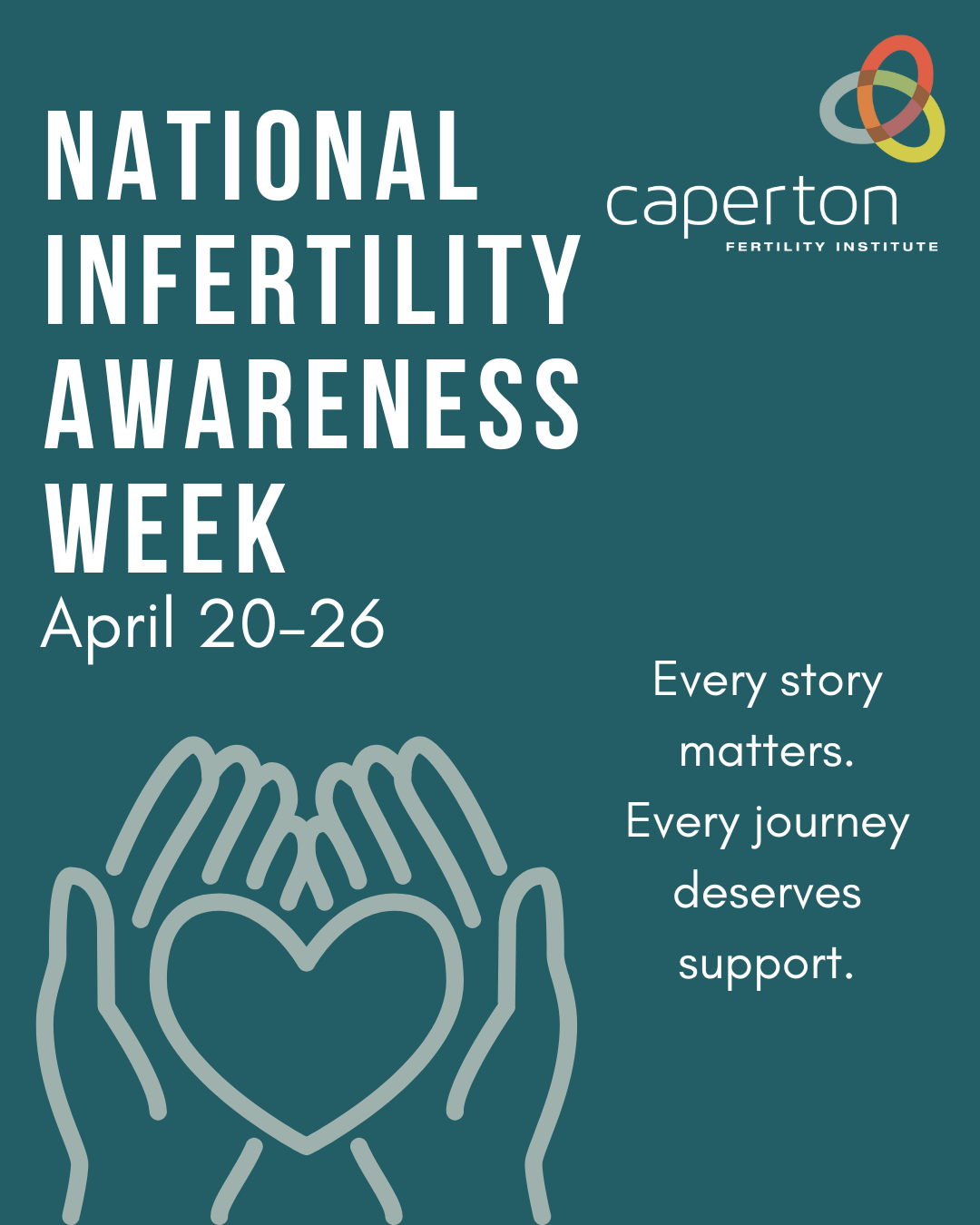National Infertility Awareness Week 2025: Breaking the Silence, Offering Hope
Caperton Fertility Institue • April 8, 2025
April 20–26, 2025 marks National Infertility Awareness Week (NIAW)—a time to shine a compassionate spotlight on a journey that affects 1 in 8 couples. At Caperton Fertility Institute, serving families in Albuquerque, NM, and El Paso, TX, we believe in replacing silence with support, isolation with community, and confusion with answers. This week, we stand with every individual and couple walking the path of infertility—because no one should have to walk it alone.

Why National Infertility Awareness Week Matters
Infertility isn't rare—but it’s rarely talked about. NIAW, led by RESOLVE: The National Infertility Association, exists to:
- Break the stigma around infertility.
- Educate the public about reproductive health.
- Empower those struggling with infertility to speak up and seek support.
- Advocate for access to care and fertility benefits.
Each year, this week reminds us that behind every statistic is a story—and every story deserves to be heard.
Infertility Facts You Should Know
- 1 in 8 couples in the U.S. struggle to conceive or carry a pregnancy to term.
- 1 in 4 pregnancies end in miscarriage.
- Infertility affects men and women equally—about 30% male factor, 30% female factor, and 40% a combination or unexplained.
- Most people wait more than a year before seeking help—even though early intervention increases success rates.
- The emotional impacts of infertility can mirror chronic illness and grief, affecting mental health and relationships.
At Caperton Fertility Institute, we’re here to change the narrative. We provide advanced, compassionate care backed by science—and shaped by understanding.
Infertility FAQ: What People Are Afraid to Ask (But Should)
How do I know if I’m infertile?
If you've been trying to conceive for 12 months (or 6 months if you're over 35) without success, it may be time to talk to a fertility specialist.
Does infertility only affect women?
Not at all. Male fertility plays a role in nearly half of all infertility cases. That’s why our evaluations always include both partners.
Is IVF my only option?
IVF is just one of many fertility treatments. Depending on your situation, options might include ovulation induction, IUI (intrauterine insemination), lifestyle changes, or surgical interventions. We tailor every plan to your unique needs.
Is infertility treatable?
In many cases, yes. With today’s technology and expert care, up to 90% of infertility cases can be treated. Caperton Fertility Institute offers some of the highest success rates in the Southwest.
How to Support Someone Struggling With Infertility
If someone you care about is going through infertility, here’s how to be there for them:
- Listen without offering advice.
- Avoid saying things like “Just relax,” or “At least you know you can get pregnant.”
- Ask, “How can I support you right now?”
- Respect their privacy—but let them know you’re a safe space if they want to talk.
- Join them in raising awareness during NIAW. Sharing educational content or attending events together can mean the world.
Let’s Talk About It—Together
At Caperton Fertility Institute, we’re using National Infertility Awareness Week as a chance to not only educate, but to empower. Whether you’re just beginning to explore your fertility or you’ve been on this journey for years, you deserve answers, support, and hope.
We invite you to:
- Schedule a consultation with our expert fertility team.
- Follow us on social media for educational resources, patient stories, and NIAW highlights.
- Share your story—because speaking up changes everything.
Proudly Serving Albuquerque, El Paso & Beyond
With cutting-edge technology, individualized treatment plans, and an award-winning team of fertility specialists, Caperton Fertility Institute is proud to support patients in New Mexico, West Texas, and beyond. During National Infertility Awareness Week—and every day—we’re here to help you take the next step toward the family you’ve been dreaming of.
Ready to Start the Conversation? Let’s turn awareness into action.

Polycystic ovary syndrome ( PCOS ) is one of the most common hormonal conditions affecting women of reproductive age. It impacts up to 1 in 10 women worldwide and is a leading cause of irregular cycles, ovulation problems, and infertility . At Caperton Fertility Institute , with fertility clinics in Albuquerque, NM, and El Paso, TX , we specialize in diagnosing and treating PCOS to help women restore their reproductive health and achieve pregnancy. What Is PCOS? PCOS is a hormonal imbalance that disrupts normal ovulation. Women with PCOS often produce higher levels of androgens (male hormones), which interfere with the release of eggs from the ovaries. Instead of regular ovulation, the ovaries may develop multiple small follicles, sometimes described as a “string of pearls” appearance on ultrasound. This condition can affect not only fertility but also long-term health , making early diagnosis and treatment essential. Common PCOS Symptoms Not all women experience PCOS in the same way, but common symptoms include: Irregular or absent menstrual cycles Difficulty ovulating or unpredictable fertile windows Excess hair growth on the face, chest, or back (hirsutism) Acne or oily skin Weight gain or difficulty losing weight Thinning hair on the scalp Darkened patches of skin (insulin resistance-related) If you are experiencing these symptoms, a fertility specialist in Albuquerque or El Paso can help confirm whether PCOS is the cause. How PCOS Affects Fertility PCOS is one of the leading causes of female infertility due to: Irregular ovulation – making it harder to predict fertile days Insulin resistance – common in women with PCOS, which worsens hormonal imbalance Hormonal disruptions – affecting egg quality and cycle regularity Inflammation – which may reduce implantation and embryo development The good news is that with proper PCOS treatment , many women can successfully conceive—either naturally or with fertility support like IUI or IVF . PCOS Fertility Treatment Options at Caperton Fertility Institute At Caperton Fertility Institute , we provide personalized fertility care for women with PCOS. Depending on your health and goals, treatment may include: Lifestyle & Medical Management Nutrition counseling and exercise support Medications to regulate menstrual cycles and lower androgen levels Ovulation Induction Letrozole or clomiphene to stimulate ovulation Careful ultrasound and lab monitoring to maximize success Advanced Fertility Treatments Intrauterine insemination (IUI) for couples who need additional support In vitro fertilization (IVF) for women who do not respond to ovulation medications or who need higher success rates Comprehensive PCOS Management Addressing metabolic health (insulin resistance, prediabetes, cholesterol) Supporting long-term wellness, not just fertility outcomes Living With PCOS: Finding Hope A diagnosis of PCOS can feel overwhelming, but it does not mean you cannot become pregnant. With the right treatment plan, women with PCOS have excellent chances of conception and healthy pregnancy . At Caperton Fertility Institute , we provide advanced reproductive technology, cutting-edge PCOS treatments, and compassionate care to help women build their families. Next Steps: PCOS Treatment in Albuquerque & El Paso If you have symptoms of PCOS or are struggling to conceive, our team can help. We combine expert medical care with personalized fertility plans designed to give you the best chance of success. 📍 Caperton Fertility Institute – Albuquerque, NM & El Paso, TX 📞 Call today or request a consultation online to learn more about PCOS and fertility treatment options .

Weight plays a critical role in reproductive health . Both overweight and underweight individuals may face challenges when trying to conceive, but for many patients struggling with obesity, even modest weight loss can significantly improve fertility outcomes. At Caperton Fertility Institute , with clinics in Albuquerque, NM, and El Paso, TX , we recognize the potential of new weight-loss therapies—such as GLP-1 receptor agonists—to support fertility and reproductive goals. How Weight Affects Fertility Excess body weight can affect fertility in multiple ways: Hormonal Imbalances – Obesity can disrupt the hypothalamic-pituitary-ovarian axis , leading to irregular menstrual cycles and ovulation problems. Insulin Resistance – Common in individuals with a higher BMI, insulin resistance can interfere with ovulation and increase the risk of polycystic ovary syndrome (PCOS) . Inflammation – Excess fat tissue produces inflammatory markers that may reduce egg quality, embryo development, and implantation success . Male Fertility – Elevated BMI in men is linked to lower testosterone, reduced sperm quality, and decreased libido. 👉 Even a 5–10% reduction in body weight can restore ovulation and improve the chances of natural conception or success with fertility treatments like IUI and IVF . What Are GLP-1 Agonists? GLP-1 (glucagon-like peptide-1) receptor agonists are a class of medications originally developed to treat type 2 diabetes. They mimic the natural GLP-1 hormone, which helps regulate blood sugar and appetite. Common GLP-1 medications include: Semaglutide (Ozempic®, Wegovy®) Liraglutide (Saxenda®) These medications have shown remarkable weight loss results in people with and without diabetes, making them a valuable tool for patients preparing for pregnancy. Benefits of GLP-1 Agonists for Fertility For patients struggling with obesity or PCOS, GLP-1 medications may support fertility by: Promoting sustainable weight loss Improving insulin sensitivity Helping regulate menstrual cycles Reducing symptoms of PCOS Lowering systemic inflammation As part of a preconception health plan , GLP-1 therapy may help create a healthier environment for conception and pregnancy. Considerations for Using GLP-1 Agonists in Fertility Treatment It’s important to use GLP-1 medications under the guidance of a fertility specialist . Key considerations include: Timing – GLP-1 agonists should generally be discontinued before trying to conceive , since safety in pregnancy has not yet been fully established. Medical Supervision – Safe and effective use requires oversight, often in combination with nutrition counseling and lifestyle changes . Individualized Plans – Not every patient is an ideal candidate. A comprehensive metabolic and fertility evaluation can help determine the best course of action. Weight Loss as a Path to Parenthood Weight loss isn’t just about numbers on the scale—it’s about optimizing your body for a healthy pregnancy . At Caperton Fertility Institute , we believe in a holistic, evidence-based approach to weight and fertility, combining: Advanced reproductive technologies (IUI, IVF, egg freezing) Metabolic health strategies The latest innovations like GLP-1 therapies Together, these tools can help patients achieve better fertility outcomes and increase their chances of bringing home a healthy baby. Next Steps: GLP-1 Agonists and Fertility Support If you are struggling with weight and fertility challenges or are interested in learning whether GLP-1 medications (Ozempic®, Wegovy®, Saxenda®) could play a role in your fertility journey, our team is here to help. 📍 Caperton Fertility Institute – Albuquerque, NM & El Paso, TX 📞 Call today or request your consultation online to explore personalized fertility solutions tailored to your health and family goals.

At Caperton Fertility Institute , our team is dedicated to offering patients the latest advances in reproductive medicine. One of the most promising emerging treatments we are exploring is intra-ovarian platelet-rich plasma (PRP) therapy , sometimes referred to as ovarian rejuvenation . This innovative approach may provide new hope for women facing diminished ovarian reserve or early ovarian aging , helping them regain options on their fertility journey. What Is Platelet-Rich Plasma (PRP)? Platelet-rich plasma (PRP) is a concentrate of platelets derived from a patient’s own blood. Platelets are naturally rich in growth factors —proteins that stimulate healing, repair, and regeneration of tissue. PRP has been widely used in: Orthopedics (joint healing, tissue repair) Dermatology (skin regeneration) Sports medicine (injury recovery) Now, these same regenerative principles are being applied in reproductive medicine to support ovarian health. How Does Intra-Ovarian PRP Work? The intra-ovarian PRP procedure involves: Drawing a small blood sample from the patient Processing the blood to isolate PRP Carefully injecting PRP into the ovaries using ultrasound guidance Potential benefits of ovarian PRP may include: Stimulating dormant ovarian follicles Improving blood flow within the ovary Supporting development of higher-quality eggs Potentially restoring hormone production in women with early ovarian decline While PRP is still considered experimental , initial studies and clinical reports show encouraging signs that it may improve ovarian function in select patients. Who Might Benefit From Ovarian PRP? Ovarian PRP therapy may be considered for women with: Diminished ovarian reserve (low AMH or high FSH levels) Premature ovarian insufficiency (POI) or early menopause A poor response to IVF stimulation in the past Age-related decline in ovarian function and delayed fertility goals ⚠️ Important Note: PRP is not a cure for infertility, and not every patient is an ideal candidate. At Caperton Fertility Institute, we take a highly individualized approach to determine if PRP could be beneficial for your unique situation. What Does the Research Say About Ovarian PRP? The use of intra-ovarian PRP is still investigational, and more large-scale clinical trials are needed. However, early studies suggest some women may experience: Improved hormone levels (FSH, AMH, estrogen) Return of menstrual cycles in cases of ovarian insufficiency Increased number of eggs retrieved during IVF cycles These findings provide hope, but it is essential to set realistic expectations . PRP is not yet a standard fertility treatment, and outcomes vary from patient to patient. The Caperton Fertility Institute Approach At Caperton Fertility Institute in Albuquerque, NM, and El Paso, TX , we are committed to bringing safe, evidence-based innovations to our patients. For women exploring ovarian rejuvenation with PRP , we offer: Compassionate counseling Thorough fertility evaluation Access to emerging therapies within the context of advanced fertility care Our goal is to maximize your chances of success—whether that involves IVF, egg freezing, or ovarian PRP therapy . Is Ovarian PRP Right for You? If you are struggling with: Diminished ovarian reserve Premature ovarian insufficiency (POI) Past IVF challenges or poor ovarian response …then ovarian PRP may be worth discussing with your fertility specialist. Every patient’s fertility journey is unique, and our team is here to help you explore your best options with clarity and hope . Next Steps At Caperton Fertility Institute , we combine cutting-edge science with compassionate care . If you are interested in learning more about ovarian rejuvenation with PRP or other fertility treatments, we invite you to schedule a consultation today. 📍 Locations in Albuquerque, NM, and El Paso, TX 📞 Call us now or request an appointment online to explore whether ovarian PRP therapy could be part of your fertility plan.
